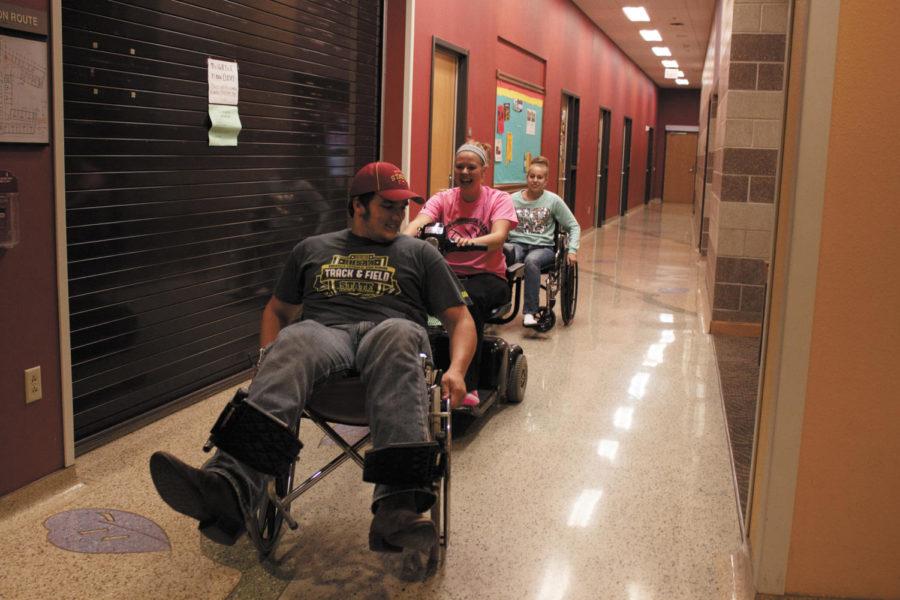Editorial: Disabilities need more attention
Sam Mereness, junior in mechanical engineering, tries out a wheelchair with some of his friends at the “Step Into My World” event, part of Disability Awareness Week. The event included discussions on the challenges people with disabilities face, and gave non-disabled persons a chance to see what it is like living various disabilities. Photo: Lyn Bryant/Iowa State Daily
October 17, 2014
A noticeable and somewhat upsetting trend regarding the common courtesy of ISU students has come to light recently. Students with physical handicaps are not being given the proper courtesy they deserve. Every building on campus is wheelchair accessible and meets the standards established by the Americans with Disabilities Act. All the Cyride buses do the same, so the blame is not with the university or any policy decision. The fault rests instead with some members of the student body.
As previously mentioned, Cyride’s scheduled routes are wheelchair-accessible and up-to-code regarding the requirements set forth by the ADA. Due to the sheer size of the university and the city, students who have to wear medical boots, rely on crutches or use wheelchairs for mobility often have few other options than Cyride.
The buses are among the most convenient forms of transportation on the Iowa State campus and around the Ames community for the physically handicapped, so they should be given priority on the buses.
Obviously, the majority of students using Cyride do not have physical impediments but use the transit system for the same convenient reasons. However, when the buses are so frequently overcrowded, it can be difficult for students on crutches or in wheelchairs to find space on the bus.
When sitting on a crowded bus, common courtesy dictates that a person that is able to stand comfortably should give up or at least offer their seat to a person wearing a boot or walking with the assistance of crutches. The individual you offer your seat to may not even want to take if from you, but it is only polite to ask.
The same courtesy should be displayed on the sidewalks between classes. With tens of thousands of students walking around campus, we all know that the sidewalks and crosswalks can be difficult to navigate. Therefore, if you see a person who may have more difficulty altering their path than you, simply step out of the way or let them go past.
Similarly, if you’re walking into a building on campus and you have the opportunity to hold the door open for another person, physically handicapped or not, hold the door. It is the smallest act of courtesy you can do for someone else, and takes less than two seconds of your time.
Behaving politely in these situations is not a form of pity, nor are you singling out these students as different or lesser. You are simply acting with the same decency that you would want others to show you in a similar situation.
If you feel as though only offering your seat, providing the right of way, or holding doors open for the physically handicapped is rude to them because you only provide those courtesies to them, perhaps you could resolve your dilemma by being more polite to everyone around you. This way it won’t be awkward for you when you act like a good person.
Your day is no more important than the day of the person walking in front of or behind you, so perform these simple and polite tasks and make another person’s life a little bit easier. Who knows, the kindness might just come back your way when you find yourself in need.

















